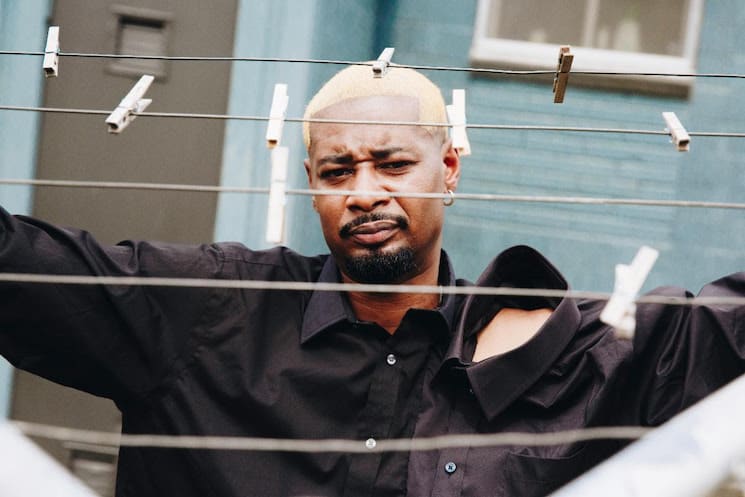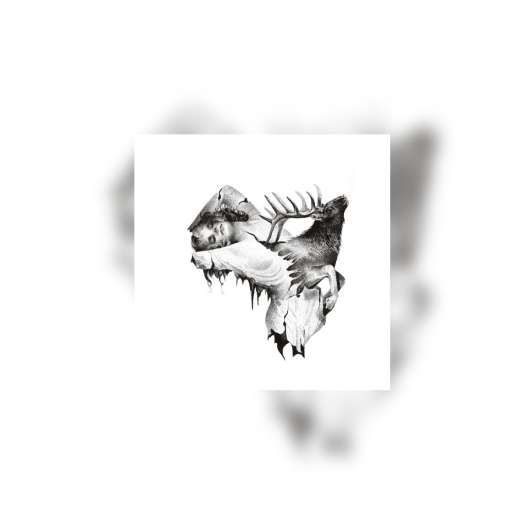By his own admission, Danny Brown is not a birthday person, and prefers to treat his special day like any other. "I act like I don't exist, to be honest," the artist tells Exclaim! by phone from his new home base in Austin, TX. "That was kind of the case when I was younger, too, because I don't acknowledge myself aging. I haven't celebrated a birthday in over 20 years."
Though calls and messages come from family and friends, the artist is adamant that celebrations are "nothing that I do on my own time. Even now, I just wake up like it's a normal day." Hearing this, I ask Brown if he remembers how he spent his 40th birthday in 2021: "I moved to Austin that day. I was on a plane, moving shit. It wasn't planned; it just ended up happening like that. I would have rather stayed in Detroit and hung out with my friends one last time, but maybe it's a good thing I didn't get into trouble."
For Brown, the close of 2023 should be cause for celebration. In addition to forging undeniable creative chemistry with JPEGMAFIA on their explosive album SCARING THE HOES, and laying down a can't-miss guest verse amid the bleakness of billy woods and Kenny Segal's "Year Zero" on the duo's Maps, he's delivered the most reflective solo LP of his career with November's Quaranta and achieved sobriety after entering rehab for alcohol abuse.
As Brown tells it, "I've always felt like hip-hop kept me young, because it's all I've ever known. I've never really had any real jobs outside of my teenage years, or had real-life adult problems. I literally do the same thing I did when I was 16 years old. I don't really feel like I ever grew up, so I don't feel like I'm old."
Quaranta, Italian for "forty," is billed as the spiritual sequel to XXX, Brown's 2011 breakout that introduced him to the wider world as a writer arresting and amusing in equal measure, delivering stories of his Detroit childhood and debaucherous adulthood with his trademark variegated vocals. Less a reference to the album's subject matter, its title spoke more to Brown's age at the time. Recorded a decade later following a bad breakup, living in downtown Detroit in the throes of addiction, Quaranta opens with Brown ruminating, "This rap shit done saved my life / And fucked it up at the same time."
"I always felt like I was putting too much pressure on myself — worrying, like, 'Is this shit going to end?' instead of being able to embrace the moment and be happy for myself," Brown admits of his career, echoing sentiments spat on the opening and closing tracks of XXX. "It was anxiety. I couldn't sleep, just scared that it would be taken from me at any given moment. I never really got a chance to feel proud of myself."
In the decade-and-change since XXX, Brown has established himself as one of hip-hop's most inimitable figures with the trio of solo albums that followed. On 2013's Old, he split his artistry in half, writing of his past and present while simultaneously wielding grimier production and charged-up early-aughts electronics with aplomb. On 2016's Atrocity Exhibition, he dove into the deepest reaches of his psyche, excavating the darkness with the aid of top-flight collaborators like Kendrick Lamar and Earl Sweatshirt, and a reported $70,000 sample clearance budget. With 2019's uknowhatimsayin¿ — executive produced by Q-Tip — he struck a much lighter tone by comparison, revelling in the expanded creative freedom through the leader of A Tribe Called Quest having him lean into post-production more than ever before.
Through it all, Brown has remained uncompromising in his artistic vision. Asked if the aforementioned pressure stemmed more from critical or commercial reception of his work, Brown answers, "Both of 'em, to be honest. In some sense, I've looked at it like, 'Maybe I should be worried about selling records and making more commercial music to be able to take care of my family.' It got to a point where I felt like I was being selfish, because I had an opportunity to do something like that, but I'm too busy worrying about being experimental. It's a gift and a curse, a pro and a con."
Those feelings were only exacerbated by Brown's struggles with addiction, which reached their peak amid pandemic isolation and led him to enter rehab. He shares, "I was tired of the revolving door of problems I was causing myself. I almost felt suicidal in some sense, and once it got to that point, it was definitely time for me to get help. I had no choice; it was like a matter of life and death."
Brown says that entering a formal rehab program "was something I felt [I needed] for years, I just didn't know how to go about it. As men, it's hard to be vulnerable like that and ask for help. I'd try to quit on my own, but it just wouldn't happen. I didn't know how to deal with shit. I could walk a straight line until someone or something threw me off, and then it's back to the races."
He continues, "That was a good thing rehab taught me: life is going to happen, and sobriety is more important than anything. You realize you're just escaping with substances and drinking or whatever, but it's making the problem worse. None of it is helping or fixing anything — which is a no-brainer, to be honest. But when you're deep in that world, you're going with whatever's gonna make you feel better at that time."
Brown explains that while he has never believed in the trope of the tortured artist, he "felt like if I stopped [drugs and drinking], the music might not be as good. Now, since I've been sober and back making music, I feel better than ever." It's also fuelled artistic enjoyment out of the booth: "Before, I just used to worry about the afterparty. Now, it's the biggest moment of my day to get on stage and have fun."
He further reflects, "Things didn't take off for me until I was 30, and I came into [the industry] kind of bitter, like I felt the game owed me something with people taking so long to acknowledge my talent. But now, I've got a whole new outlook. Hearing my favourite rappers I grew up listening to still competing at the highest level gives me hope to be able to do it. It's not my talent in the first place, you know? I don't get to dictate when I stop — it's a God-given talent. So I always say, God's my ghostwriter, because I don't know where this shit comes from. So it ain't on me; He decides when I'm done."
Brown's intuitive album sequencing once again factors into Quaranta. Sandwiched between the fiery flows and riotous writing of highlights "Tantor" and "Dark Sword Angel" is the artist's personal favourite in "Ain't My Concern." Minimal production from Quelle Chris and Chris Keys conjures the image of Brown reflected in the mirrored funhouse of his mind, seeking a way forward. "I'm telling people where I'm at and where I want to go with my music," he explains. "When you try to rap cool shit and come up with dope punchlines when you've been doing it for over 20 years, it's like, 'Are there any punchlines left in me?'"
The album's more poignant, personal second half begins with "Down wit It," on which a sullen Brown realizes, "Lifestyle of this music shit / Had me on some stupid shit / Never would've thought it'd fuck up who I'm closest with / All my fault, for most of it." While the song's hook interpolates the Geto Boys' haunting "Mind Playing Tricks on Me," Brown reveals that he drew more inspiration from Common's 1994 ode to rap, "I Used to Love H.E.R."
He explains, "As dark as ["Down wit It"] is, I still wanted to lead with hope. I was going through a breakup at that time, but I also wanted to have the double entendre. When I say, 'Now I'm realizing that I love her,' I'm talking about hip-hop: I want to quit, I want to give up. But I come to realize why I do this, why I really love it."
Following the soft self-assurance of "Shakedown" and grappling with the passage of time on the wonderfully ornate "Hanami," Quaranta closes with the featherlight "Bass Jam," a lullaby-like reflection on Brown's life with music rather than his life in it. Gently mapping the soundtrack of his youth atop Paul White's sturdy, minimal bass line and atmospheric guitar swells, he captures "that innocence, that childhood stage where I just loved music," in addition to how our longtime favourites can speak when words fail to: "Play another song, let the music talk for us / Have us shedding tears 'fore we get through the chorus."
On the other side of Quaranta, Brown has reached the conclusion that "I gotta do what my heart tells me, and everything will sort itself out. And my heart tells me, 'Make the music that the ghostwriter upstairs gives me.' Don't think; make music with my heart and not my brain."
Juxtaposing Quaranta's more reflective recordings is the powder keg that is SCARING THE HOES, Brown's collaborative full-length with JPEGMAFIA named among Exclaim!'s best albums of 2023. Following a pair of preliminary linkups on uknowhatimsayin¿, the album and its subsequent DLC PACK EP proved their respective maniacal musical approaches are a perfect match. On an exceptional entry in the lineage of rap records crafted on a foundation of friendship, it's a joy to hear Brown leading the charge on the hook of "Burfict!" and bending biblical sex raps around the gospel sample of "God Loves You," before declaring how he "Should be in the psych ward for what I do with vocal cords" on "Where Ya Get Ya Coke From?"
"I think it was 'Baby I'm Bleeding' [from 2018's Veteran]," Brown recalls of his introduction to JPEGMAFIA, sharing with a laugh, "When I first heard it, I felt like, 'Shit, my days are numbered. This motherfucker's about to take all my fans.' Now, I just feel like we're coming from the same spirit. We're on the same wavelength."
Brown commends his collaborator for working with him on SCARING THE HOES during "a really difficult time" before he entered rehab, sharing how sessions swung between productivity and procrastination "because I was just getting fucked up the entire time." He reflects, "I feel like, out of anybody I've worked with, [JPEGMAFIA] was the most patient with me, and that's what I felt made our friendship tighter. I felt like he wasn't just about the music; he's really my friend. He cares about me."
With Quaranta capping a fruitful year both personally and professionally, Brown feels his sixth solo album is "a good ending to the story of where I'm at in my life." Whether looking back or ahead, he's also determined to continue cementing his legacy as one of rap's — if not recorded music's — most idiosyncratic artists.
An omnivorous listener who extols the genius of 100 gecs and Nia Archives during our conversation, he shares how inspiration has come to him through watching music documentaries, naming Edgar Wright's 2021 feature The Sparks Brothers as one that's stuck with him: "Seeing their story, how they were so weird and people didn't get their shit, they just kept it going and going — and, eventually, the world caught up to them."
For Brown, his next decade of creativity is also about continuing to inspire. "At the end of the day, I've learned that this could help people," he says. "A lot of songs I've made talk about my experiences and what I've been through. As much as a lot of that was dark, or was like therapy for me in getting shit out that I didn't really want to talk about, I get messages from people saying it helped them with what they were going through. Now, I want to really just use music to help people, or to make me feel good."
He continues, "During the time of recording [Quaranta], I really didn't have any hope. I wasn't that much in love with what I'm doing now, but it takes going through shit to realize how blessed you are. I really didn't feel like I'd be able to live to see this album come out, to be honest. It's a blessing."
Though calls and messages come from family and friends, the artist is adamant that celebrations are "nothing that I do on my own time. Even now, I just wake up like it's a normal day." Hearing this, I ask Brown if he remembers how he spent his 40th birthday in 2021: "I moved to Austin that day. I was on a plane, moving shit. It wasn't planned; it just ended up happening like that. I would have rather stayed in Detroit and hung out with my friends one last time, but maybe it's a good thing I didn't get into trouble."
For Brown, the close of 2023 should be cause for celebration. In addition to forging undeniable creative chemistry with JPEGMAFIA on their explosive album SCARING THE HOES, and laying down a can't-miss guest verse amid the bleakness of billy woods and Kenny Segal's "Year Zero" on the duo's Maps, he's delivered the most reflective solo LP of his career with November's Quaranta and achieved sobriety after entering rehab for alcohol abuse.
As Brown tells it, "I've always felt like hip-hop kept me young, because it's all I've ever known. I've never really had any real jobs outside of my teenage years, or had real-life adult problems. I literally do the same thing I did when I was 16 years old. I don't really feel like I ever grew up, so I don't feel like I'm old."
Quaranta, Italian for "forty," is billed as the spiritual sequel to XXX, Brown's 2011 breakout that introduced him to the wider world as a writer arresting and amusing in equal measure, delivering stories of his Detroit childhood and debaucherous adulthood with his trademark variegated vocals. Less a reference to the album's subject matter, its title spoke more to Brown's age at the time. Recorded a decade later following a bad breakup, living in downtown Detroit in the throes of addiction, Quaranta opens with Brown ruminating, "This rap shit done saved my life / And fucked it up at the same time."
"I always felt like I was putting too much pressure on myself — worrying, like, 'Is this shit going to end?' instead of being able to embrace the moment and be happy for myself," Brown admits of his career, echoing sentiments spat on the opening and closing tracks of XXX. "It was anxiety. I couldn't sleep, just scared that it would be taken from me at any given moment. I never really got a chance to feel proud of myself."
In the decade-and-change since XXX, Brown has established himself as one of hip-hop's most inimitable figures with the trio of solo albums that followed. On 2013's Old, he split his artistry in half, writing of his past and present while simultaneously wielding grimier production and charged-up early-aughts electronics with aplomb. On 2016's Atrocity Exhibition, he dove into the deepest reaches of his psyche, excavating the darkness with the aid of top-flight collaborators like Kendrick Lamar and Earl Sweatshirt, and a reported $70,000 sample clearance budget. With 2019's uknowhatimsayin¿ — executive produced by Q-Tip — he struck a much lighter tone by comparison, revelling in the expanded creative freedom through the leader of A Tribe Called Quest having him lean into post-production more than ever before.
Through it all, Brown has remained uncompromising in his artistic vision. Asked if the aforementioned pressure stemmed more from critical or commercial reception of his work, Brown answers, "Both of 'em, to be honest. In some sense, I've looked at it like, 'Maybe I should be worried about selling records and making more commercial music to be able to take care of my family.' It got to a point where I felt like I was being selfish, because I had an opportunity to do something like that, but I'm too busy worrying about being experimental. It's a gift and a curse, a pro and a con."
Those feelings were only exacerbated by Brown's struggles with addiction, which reached their peak amid pandemic isolation and led him to enter rehab. He shares, "I was tired of the revolving door of problems I was causing myself. I almost felt suicidal in some sense, and once it got to that point, it was definitely time for me to get help. I had no choice; it was like a matter of life and death."
Brown says that entering a formal rehab program "was something I felt [I needed] for years, I just didn't know how to go about it. As men, it's hard to be vulnerable like that and ask for help. I'd try to quit on my own, but it just wouldn't happen. I didn't know how to deal with shit. I could walk a straight line until someone or something threw me off, and then it's back to the races."
He continues, "That was a good thing rehab taught me: life is going to happen, and sobriety is more important than anything. You realize you're just escaping with substances and drinking or whatever, but it's making the problem worse. None of it is helping or fixing anything — which is a no-brainer, to be honest. But when you're deep in that world, you're going with whatever's gonna make you feel better at that time."
Brown explains that while he has never believed in the trope of the tortured artist, he "felt like if I stopped [drugs and drinking], the music might not be as good. Now, since I've been sober and back making music, I feel better than ever." It's also fuelled artistic enjoyment out of the booth: "Before, I just used to worry about the afterparty. Now, it's the biggest moment of my day to get on stage and have fun."
He further reflects, "Things didn't take off for me until I was 30, and I came into [the industry] kind of bitter, like I felt the game owed me something with people taking so long to acknowledge my talent. But now, I've got a whole new outlook. Hearing my favourite rappers I grew up listening to still competing at the highest level gives me hope to be able to do it. It's not my talent in the first place, you know? I don't get to dictate when I stop — it's a God-given talent. So I always say, God's my ghostwriter, because I don't know where this shit comes from. So it ain't on me; He decides when I'm done."
Brown's intuitive album sequencing once again factors into Quaranta. Sandwiched between the fiery flows and riotous writing of highlights "Tantor" and "Dark Sword Angel" is the artist's personal favourite in "Ain't My Concern." Minimal production from Quelle Chris and Chris Keys conjures the image of Brown reflected in the mirrored funhouse of his mind, seeking a way forward. "I'm telling people where I'm at and where I want to go with my music," he explains. "When you try to rap cool shit and come up with dope punchlines when you've been doing it for over 20 years, it's like, 'Are there any punchlines left in me?'"
The album's more poignant, personal second half begins with "Down wit It," on which a sullen Brown realizes, "Lifestyle of this music shit / Had me on some stupid shit / Never would've thought it'd fuck up who I'm closest with / All my fault, for most of it." While the song's hook interpolates the Geto Boys' haunting "Mind Playing Tricks on Me," Brown reveals that he drew more inspiration from Common's 1994 ode to rap, "I Used to Love H.E.R."
He explains, "As dark as ["Down wit It"] is, I still wanted to lead with hope. I was going through a breakup at that time, but I also wanted to have the double entendre. When I say, 'Now I'm realizing that I love her,' I'm talking about hip-hop: I want to quit, I want to give up. But I come to realize why I do this, why I really love it."
Following the soft self-assurance of "Shakedown" and grappling with the passage of time on the wonderfully ornate "Hanami," Quaranta closes with the featherlight "Bass Jam," a lullaby-like reflection on Brown's life with music rather than his life in it. Gently mapping the soundtrack of his youth atop Paul White's sturdy, minimal bass line and atmospheric guitar swells, he captures "that innocence, that childhood stage where I just loved music," in addition to how our longtime favourites can speak when words fail to: "Play another song, let the music talk for us / Have us shedding tears 'fore we get through the chorus."
On the other side of Quaranta, Brown has reached the conclusion that "I gotta do what my heart tells me, and everything will sort itself out. And my heart tells me, 'Make the music that the ghostwriter upstairs gives me.' Don't think; make music with my heart and not my brain."
Juxtaposing Quaranta's more reflective recordings is the powder keg that is SCARING THE HOES, Brown's collaborative full-length with JPEGMAFIA named among Exclaim!'s best albums of 2023. Following a pair of preliminary linkups on uknowhatimsayin¿, the album and its subsequent DLC PACK EP proved their respective maniacal musical approaches are a perfect match. On an exceptional entry in the lineage of rap records crafted on a foundation of friendship, it's a joy to hear Brown leading the charge on the hook of "Burfict!" and bending biblical sex raps around the gospel sample of "God Loves You," before declaring how he "Should be in the psych ward for what I do with vocal cords" on "Where Ya Get Ya Coke From?"
"I think it was 'Baby I'm Bleeding' [from 2018's Veteran]," Brown recalls of his introduction to JPEGMAFIA, sharing with a laugh, "When I first heard it, I felt like, 'Shit, my days are numbered. This motherfucker's about to take all my fans.' Now, I just feel like we're coming from the same spirit. We're on the same wavelength."
Brown commends his collaborator for working with him on SCARING THE HOES during "a really difficult time" before he entered rehab, sharing how sessions swung between productivity and procrastination "because I was just getting fucked up the entire time." He reflects, "I feel like, out of anybody I've worked with, [JPEGMAFIA] was the most patient with me, and that's what I felt made our friendship tighter. I felt like he wasn't just about the music; he's really my friend. He cares about me."
With Quaranta capping a fruitful year both personally and professionally, Brown feels his sixth solo album is "a good ending to the story of where I'm at in my life." Whether looking back or ahead, he's also determined to continue cementing his legacy as one of rap's — if not recorded music's — most idiosyncratic artists.
An omnivorous listener who extols the genius of 100 gecs and Nia Archives during our conversation, he shares how inspiration has come to him through watching music documentaries, naming Edgar Wright's 2021 feature The Sparks Brothers as one that's stuck with him: "Seeing their story, how they were so weird and people didn't get their shit, they just kept it going and going — and, eventually, the world caught up to them."
For Brown, his next decade of creativity is also about continuing to inspire. "At the end of the day, I've learned that this could help people," he says. "A lot of songs I've made talk about my experiences and what I've been through. As much as a lot of that was dark, or was like therapy for me in getting shit out that I didn't really want to talk about, I get messages from people saying it helped them with what they were going through. Now, I want to really just use music to help people, or to make me feel good."
He continues, "During the time of recording [Quaranta], I really didn't have any hope. I wasn't that much in love with what I'm doing now, but it takes going through shit to realize how blessed you are. I really didn't feel like I'd be able to live to see this album come out, to be honest. It's a blessing."




